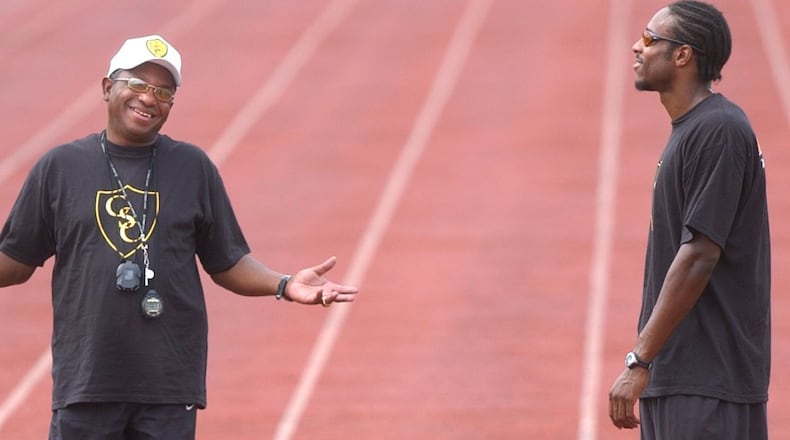One of Napoleon Cobb’s great students, two-time Olympic hurdles silver medalist Terrence Trammell, is a coach himself these days. It’s been 30 years since Cobb first coached Trammell at Southwest DeKalb High, but Trammell still liked to make Cobb proud.
So on Tuesday, when the USTFCCA ranked Trammell’s North Carolina A&T hurdlers No. 1 in the country, Trammell wanted to tell Cobb the news.
But he couldn’t. Cobb, in rapidly declining health in recent months, having battled myeloma for nearly 10 years, was near death. A member of the Georgia Athletic Coaches Association Hall of Fame, Cobb died that evening at age 80.
“Coach Cobb definitely did not get his just due,” Trammell said. “He did so much for the sport and the youth in our area. He was basically a second father to me. He was always there for advice and wisdom. When I became a coach, he always shared with me things that would help. I find myself today coaching like he did.”
In a football-loving state, track coaches probably don’t get their due, even one as successful as Cobb, a member of the Georgia Athletic Coaches Association Hall of Fame.
And Cobb was an exemplary football coach, too. He might be called Southwest DeKalb coach Buck Godfrey’s right-hand man during the football program’s vaunted run in the 1990s and beyond, which included a 1995 Class 4A championship team that still is revered in DeKalb County.
It was track and field that set Cobb apart, though. His high school teams won 12 state championships, one in California, three at old Gordon High of DeKalb County in the 1970s and eight at Southwest DeKalb, the last in 2015 just before he retired at 72. Cobb sent dozens of his athletes to colleges on track scholarship.
A legacy of Olympic greats
His most renowned pupils were Olympic stars Trammell (South Carolina) and Angelo Taylor (Georgia Tech). Trammell won silver in the 110-meter hurdles in 2000 and 2004. Taylor won gold in the 400-meter hurdles in 2000 and 2012. They were member of Southwest’s 1996 track team that earned a mythical national title.
Cobb was their guest at the 2000 Olympics in Australia, then coached both at the 2004 Olympics in Greece, training them at their old DeKalb stomping grounds in the months leading up.
“He trained us like pro athletes when we were in high school,” Taylor said. “We’d study film. He tried to get us to learn from Olympians, especially the champions.”
Back then, Cobb showed Taylor video of iconic hurdler Edwin Moses, a former Morehouse runner whom Cobb befriended during Cobb’s time as Morehouse’s track coach from 1978-89.
Cobb, an Atlanta native and Turner High graduate, got the name Napoleon after his mother flipped a history book in the air and it landed on a page about the French emperor.
Credit: AJC�
Credit: AJC�
Destined in name to lead, Cobb learned the craft as a distance runner at Tennessee State. He studied Ed Temple, coach of State’s famous Tigerbelles. They included Olympic greats Wyomia Tyus and Edith McGuire, both from Georgia, and Wilma Rudolph. Cobb knew them all. Olympic long jump champion Ralph Boston, also a Tennessee State alumnus, was another friend and inspiration, as was Olympic sprinter Isabelle Daniels Holston, with whom he worked at Gordon.
Out of college, Cobb began coaching in Berkeley, California, and learned from Bud Winter, the San Jose State coach who trained 27 Olympians, including sprinters John Carlos and Tommie Smith.
“It’s about the fundamentals and the scientific aspect of the sport,” Cobb said in a 2015 interview with The Atlanta Journal-Constitution, referencing lessons learned from Temple and Winter. “That’s how you build and maintain a program that will last for years and years.”
Taylor called Cobb a technician, a strategist and a motivator.
“He had the spirit of a champion,” Taylor said. “I had that same spirit and fire. That’s why we worked so well together. He was the coach. I was his pupil. I just listened. I bought into what he was saying. He was a great mentor.”
Trammell’s college coach, South Carolina’s Curtis Frye, thought highly of Cobb.
“There are a lots of kids in Atlanta that are talented,” Frye said in a 2000 AJC interview. “Some of them lose focus, and coach Cobb keeps them from losing focus. He didn’t give them mechanical defects. He doesn’t break athletes down. A lot of time when we get an athlete, they’re done. (His athletes) run fast because they’re trained too well.”
‘Treated athletes like his own kids’
Taylor and Trammell praised Cobb most of all for his heart. Godfrey said Cobb’s “weakness” was children, meaning he cared for them so much.
Said Taylor, “He looked at us as his family. He treated his athletes like he’d treat his own kids. One thing he wanted to do was to teach kids how to be champions in life.”
Trammell remembered his generosity.
“If an athlete really had potential and couldn’t afford running shoes or track spikes, he’d go into his pocket and purchase them,” Trammell said. “At some of the meets outside of high school, he’d go and pay entry fees to make sure they had an opportunity for exposure.”
Trammell said Cobb was firm but fair. “He had a hard exterior, but he was nurturing.”
Credit: Hyosub Shin
Credit: Hyosub Shin
Cobb had four children of his own – daughters Shan and Koko and twin sons Jabari and Nap Jr. The boys ran track in college, Jabari at Morehouse, Nap Jr. at Morris Brown.
Jabari believed Cobb, whose own father died when Cobb was young, saw himself as a father figure more than a coach. He would drive athletes to practices and meets, especially those without fathers.
Cobb’s own family survived an unthinkable tragedy in 1994, which Jabari felt was his father’s defining moment.
Cobb’s wife, Pauline, was killed at age 51. A patient supervisor at a home for severely mentally ill homeless people, she was shot and killed by a former patient having a delusional episode.
‘”My father’s greatest achievement didn’t take place on a track or a football field but in his bedroom on June 22, 1994, after my mother was killed,” Jabari Cobb said. “He absorbed that news privately, then got all his children together in his bedroom and told us what happened. He huddled us up like he would as a coach and declared we’re going to pick up and go on. We’re going to finish college and get through this. That’s the greatest victory he had.”
Great partnership at Southwest DeKalb
Godfrey, the football coach, found in Cobb a jewel of an assistant coach and a brother. They were born the same day, April 4, 1943. Cobb marveled at the coincidence and insisted they research their birth certificates to find the exact minute.
“I was born at 11:10, and he was born at 11:30, so later on, he started calling me big brother, and I referred to him as little brother,” Godfrey said. “That’s just the fun we had like that.”
That they would hit it off so well was not evident from the start. The two worked together at Gordon in the 1970s but merely were cordial then. Godfrey coached the baseball team, and after Godfrey’s team hit home runs over the fence and onto Cobb’s track during live meets, nearly hitting one of Cobb’s runners, Cobb joked that he expected fair warning in the future when the big hitters were coming to the plate.
Ironically, Cobb was the more accomplished football coach at the time. He was Gordon’s head coach for one season, 1978. The Generals went 11-2 and reached the state semifinals. Cobb left Gordon to be Morehouse’s track coach for a decade.
Godfrey became Southwest DeKalb’s football coach in 1983, launching a career that would net him 13 region titles, a county-record 274 wins and a recent induction into the Georgia Sports Hall of Fame.
When Southwest DeKalb hired Cobb away from Morehouse, primarily to be a track coach in 1989, Godfrey didn’t immediately think anything of it.
Then when Cobb helped Godfrey reach the state semifinals his first season, making his mark as an offensive schemer, Godfrey knew he had something special. The two became tight friends, frequently traveling and rooming together at coaching clinics around the South.
“When he and I coached together, we would play a game and we’d win, and everybody would be hooping and hollering outside,” Godfrey said. “He’d already have film on the team we were playing next week. So he and our film guy, Ken Cartwright, and myself would get one of those large cups of coffee from Dunkin’ Donuts and start looking at film. It was pretty intricate. We’d come out of that building at maybe 3-4 in the morning.”
The coaches would make note of the smallest details, such as whether a punt returner liked high balls or end over end, or did better fielding them to his right or left.
“The depths he’d go to prepare athletes to win was remarkable,” said Trammell, a defensive back on Southwest’s 1995 football champions.
Taylor became the leading receiver on that team, which starred future Georgia Bulldogs and NFL quarterback Quincy Carter.
Godfrey and Cobb shared their athletes, something less common today as sports have become year-round endeavors. Godfrey and Cobb had a more altruistic arrangement.
“What he had, I had, and what I had, he had,” Godfrey said. “We agreed to bring out the best in each other and let nobody bring a wedge between us.”
‘A big blow to our community’
Carter, the quarterback, remembered Cobb as the one who taught him the option offense. He was in touch with Cobb regularly in his final weeks and called Cobb’s death ‘’a big blow to our community.’’ But Carter also thought Cobb would want his friends to move ahead and stay positive.
“I can hear him saying right now, ‘Big man,’ – that was his saying, ‘big man’ – he’d be saying, ‘Big man, don’t worry about me. Go on with life,’” Carter said.
Godfrey agreed. Cobb once told him, perhaps jokingly, how he wanted his funeral to go.
“He told me something one time, he said, ‘When I die, whoever it is doing the burying can say all the bad things and good things they won’t because I’m not going to be there,’” Godfrey said. “‘But make sure over my head it says, ‘Winner.’ I said what? He said, ‘Put down winner – W-I-N-N-E-R.’”
Cobb’s memorial service will be at 12:30 p.m. Feb. 10 at New Mercies Christian Church In Lilburn.
Godfrey, recalling a story years ago when they still worked side by side, said there was nothing left unspoken between them.
“He got angry at me about something, probably over a play we ran, or some discipline matter, I don’t remember,” Godfrey said. “He got to the point where he had that look in his eye and started pouting. And then I just said, ‘I love you.’ He told me, ‘You’re an ex-Golden Gloves fighter who poured concrete, and you’re looking up at me saying I love you?’ He said he’d never had a man tell him that in his life. I guess it was one of those epiphanies. I was at a point in my life where I could say that to him. ‘I love you.’”
About the Author
The Latest
Featured




